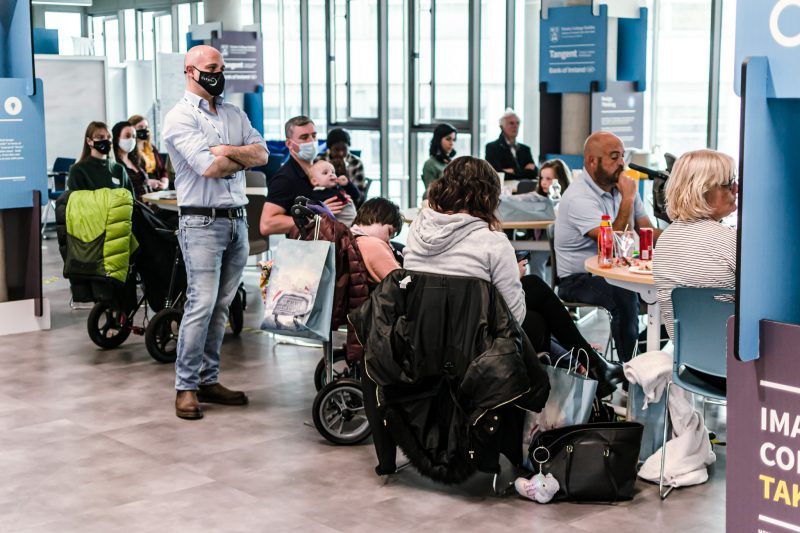Trinity neuroscientists developing potential novel treatments for rare genetic disorder in children
Posted on: 07 October 2021
Trinity neuroscientists studying a rare, untreatable neurodevelopmental disorder in children have identified previously unknown target areas for potential new treatments. This new development and its potential impacts was announced at a very special ‘CDD Family Awareness Day’ in Dublin.

What is Cyclin-dependent kinase-like 5 (CDKL5) deficiency disorder?
Cyclin-dependent kinase-like 5 (CDKL5) deficiency disorder (CDD) is a rare neurodevelopmental disorder that is caused by mutations in the CDKL5 gene. The CDKL5 gene is located on the X chromosome. The CDKL5 gene provides instructions for making a protein that is essential in forming the connections for normal brain development.
Mutations in the CDKL5 gene results in the absence of a functional protein. CDD affects 1 in 40,000 live births, this is equal to 2 children being diagnosed each week. CDD primarily affects girls (~90%) due to the fact that the gene is located on the X chromosome, one of the two chromosomes that determine an individual’s sex. Females have two X chromosomes and males have one X and one Y.
In Ireland there are currently 7 known families with a child that has been diagnosed with CDD, but researchers believe the disorder to be underdiagnosed as it currently requires genetic testing.
While there is no known cure for CDD, researchers are working hard to identify biomarkers and develop new treatments with the ultimate goal of finding a cure. Research in CDKL5 centres around preclinical models including in vitro (in a test tube) and in vivo (in animal models). The use of animal models such as the ‘Cdkl5-knockout mice (KO mice)’ (mice that lack the Cdkl5 gene) have been an invaluable tool to gather insights into the molecular changes underlying CDD.
What CDD research is underway at Trinity College?
The Trinity team’s research, based in the Bianchi Lab and Ulysses Neuroscience Ltd. in the Trinity College Institute of Neuroscience (TCIN) focuses on the biology and pharmacology of microtubule dynamics as:
i) a biomarker to assess the severity and progress of CDD, and
ii) a target to develop novel pharmacological treatments.
Microtubules, which act like large, complex scaffolding structures play a vital role in the development of brain cells and in supporting the formation, maintenance and re-modelling of synapses, which brain cells use to communicate. Thus, dysfunction in microtubule dynamics leads to altered brain development and loss of synapses.
Dr Massimiliano Bianchi, Adjunct Assistant Professor, Bianchi Lab and Founder & President of Ulysses Neuroscience Ltd and Trinity College Institute of Neuroscience (TCIN) explains:
Finding a translational biomarker (measurable in both animal models and patients) for the severity and progression of CDD is extremely important both for research, and for clinical needs. Thus, a good biomarker would allow to effectively assess the efficacy of treatments in development by making it possible to directly compare effects in the animal models and in the patients, thus increasing the translational power and significance of the research.
CDD Family Awareness Day
The research team hosted the CDD Family Awareness Day on October 2nd 2021, where they announced that the alterations in plasma microtubule dynamics observed in animal models of CDD have also been found in plasma samples of CDD patients, thus confirming the analysis of microtubule dynamics in plasma as a non-invasive biomarker of disease progression in CDD. This finding will be crucial for families as the progression of the disease can now be monitored in a non-invasive way, which is ultimately better for the patient.

Carolina De Pasquale (Patient Insight Manager in Bianchi’s team at Ulysses Neuroscience Ltd.) explains the important of the family awareness day:
We work as part of a network of dedicated researchers, patients, and other stakeholders to improve our understanding of CDD and develop reliable biomarkers that can be used to develop new treatments and monitor clinical disease progression. The development of effective biomarkers is very important to improve the assessment of therapeutic changes in the patients and to monitor the effect of drugs.
We believe that the patient should be at the centre of all medical research, and that their needs should be considered holistically, from “simple” daily needs to “complex” pharmacological treatments. In line with our ethos, we have a direct line of communication with the families and patients of the disorders we research, and we organise frequent focus groups to assess whether our research goals are in line with the actual concerns of those who live with the disorder.
Awareness and peer support are extremely important when dealing with a life altering disorder such as CDD, and as such we are proud to help organising events, such as the Family Awareness Day that provide the community with an opportunity to meet, catch up with current research, and give us direct feedback on their concerns and needs. Lastly, this event is important to keep the families engaged in the research process and reassure them on the safety and interest to participate in clinical studies.

Trinity plans for establishing the world’s first CDD biobank
Dr Bianchi also announced the establishment of the first Irish colony of Cdkl5-KO mice in Ireland, and his team’s collaboration with hospitals and CDD family associations all over the world to collect plasma, and other biological fluids (saliva or urine) from CDD patients. Another milestone announcement told of plans to establish the first dedicated CDD biobank in the world at Trinity College. The biobank represents a unique opportunity for researchers around the world to acquire an important number of CDD samples for their research on translational biomarkers of CDD.
Bianchi’s team has gained an important global reputation of excellence in patient-centric and translational research and the biobank will ensure that current and future researchers can collaborate internationally. The Trinity biobank will attract interest from industries with the possibility to push for more funding to be invested in developing new treatments for CDD and other neurodevelopmental disorders.
